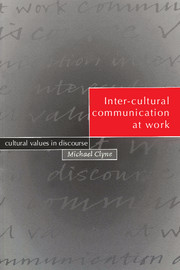Book contents
- Frontmatter
- Contents
- List of figures
- List of tables
- Acknowledgements
- 1 Introducing the field
- 2 Setting up the project
- 3 Speech acts in inter-cultural discourse
- 4 Variation in communication patterns and inter-cultural communication breakdown in oral discourse
- 5 Written discourse across cultures
- 6 Towards a linguistics of inter-cultural communication
- 7 Some theoretical and practical implications
- Appendix 1 Non-key informants
- Appendix 2 Index of informants' pseudonyms, ages, and ethnolinguistic background
- Appendix 3 Two long transcriptions
- References
- Index of text transcriptions
- Index of names
- Index of subjects
2 - Setting up the project
Published online by Cambridge University Press: 05 June 2012
- Frontmatter
- Contents
- List of figures
- List of tables
- Acknowledgements
- 1 Introducing the field
- 2 Setting up the project
- 3 Speech acts in inter-cultural discourse
- 4 Variation in communication patterns and inter-cultural communication breakdown in oral discourse
- 5 Written discourse across cultures
- 6 Towards a linguistics of inter-cultural communication
- 7 Some theoretical and practical implications
- Appendix 1 Non-key informants
- Appendix 2 Index of informants' pseudonyms, ages, and ethnolinguistic background
- Appendix 3 Two long transcriptions
- References
- Index of text transcriptions
- Index of names
- Index of subjects
Summary
Australia's multilingual and industrial situation
In this chapter, I will discuss the setting up of the project which is providing us with our data on verbal communication in English between immigrants of different non-English-speaking language and cultural backgrounds. Australia's ethnolinguistic diversity offers challenges and opportunities to sociolinguistic research. It is estimated that over one hundred languages are spoken on a regular basis in Melbourne, the city in which the data were gathered. According to the 1986 Census, 22.7% of the population then used a language other than English at home. This does not include the many people who employ a language other than English regularly but not in their own homes (cf. Clyne 1991).
The wide cultural diversity of the Australian population provides rich contexts for research into inter-cultural communication. In Melbourne, for instance, Croats, Sinhalese and Vietnamese, Maltese, Poles, and Chinese have co-settled and worked together. These groups – in contrast to, say, Greeks and Turks, Germans and Croats, Italians and Maltese, Chinese and Vietnamese – have had no history of interaction as groups and are unlikely to share communication patterns that they do not share with the ‘mainstream’ Australians (i.e. those of British descent and those who have assimilated into that dominant group).
- Type
- Chapter
- Information
- Inter-cultural Communication at WorkCultural Values in Discourse, pp. 32 - 47Publisher: Cambridge University PressPrint publication year: 1995

